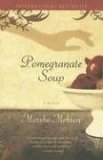Summary | Excerpt | Reading Guide | Reviews | Beyond the book | Read-Alikes | Genres & Themes | Author Bio

The new year is not so new anymore, and as we tear those daily
calendar pages off, many of the carefully made and sincerely meant New Year's
Resolutions begin to be discarded as well. The government, which keeps track
of such things, lists "lose weight" and "eat right" as among the
most popular resolutions of Americans. I suspect that Lillian, the wonderfully
intuitive cook and slightly mysterious central character of Erica Bauermeister's
nourishing first novel would advise those resolution-makers to instead seek
a better relationship with food, and to learn what cooking is really about:
healing as well as comfort.
Lillian and the eight students attending her current cooking class (held monthly
in the kitchen of her restaurant) each get a chapter, a structure that can be
difficult to build a novel around when there are so many characters and so few
chapters. But Bauermeister demonstrates a sure hand—impressive in a first novel—in
using each chapter to create relationships among characters and advance the
plot even as she concentrates on one character and the cooking lesson for that
month. The monthly schedule is key; it allows her to move through seasons and
provides off-page time for characters' lives to progress. Characters form relationships:
there are romances, mentorships, and a network of caregiving created as their
lives intersect both in and out of the kitchen.
Lillian learned how to cook in order to bring her mother back to her after her
father left them. "In this new life, Lillian's mother's face became a series
of book covers, held in place where eyes, nose, or mouth might normally appear.
Lillian soon learned that book covers could forecast moods like facial expressions,
for Lillian's mother swam deeply into the books she read, until the personality
of the protagonist surrounded her like a perfume applied by an indiscriminate
hand." She is assisted in her efforts by Abuelita, the proprietor of a small
grocery store Lillian comes across during a walk. Cooking becomes Lillian's
religion and her life's work; she recognizes that many of her students come
to her needing the kind of guidance she continues to seek from Abuelita. The
recipes used in cooking class are unwritten and created collectively. Lillian
knows that her students must identify their own "essential ingredients" and
provide their own recipes for both their food and their lives.
Although the characters in the cooking class come from what may seem predictable
situations—among them are a young mother, a grieving widower, a teenager in
a bad relationship, a woman whose mental grasp on her life is slipping away,
a long-married couple with a secret—Bauermeister's treatment of them rises well
above stereotypical. Claire, the young mother of two small children, feels that
"since she became a mother it was as if her body had become invisible to anyone
but her children. When was the last time someone she didn't know had looked at
her as if she was ... what? A possibility."
Isabelle "found more often than not she was lost—words, names, her children's
phone numbers arriving and departing from her mind like trains without a
schedule." She wonders "'if it is foolish to make new memories when you know you are going
to lose them.'"
Bauermeister treats all her characters with similar care and imagination. Her
novel is as magical and healing as the food Lillian and her students create. It's
a food novel with ideas, but not recipes. It offers lessons on everything from
a simple crab dish (with instructions on how to kill the crabs) to homemade tortillas
and salsa ("it was both satisfying and invigorating, full of textures and adventures,
like childhood held in your hand") to an elegant white cake with white icing.
I read it after Christmas, during a down time in the season and in my life. It
brought me more than great pleasure: it made me feel better, but more, it made
me feel hopeful and helped me to remember that arid periods pass, that life gets
its flavors back.
![]() This review was originally published in The BookBrowse Review in February 2009, and has been updated for the
January 2010 edition.
Click here to go to this issue.
This review was originally published in The BookBrowse Review in February 2009, and has been updated for the
January 2010 edition.
Click here to go to this issue.

If you liked The School of Essential Ingredients, try these:

by Amanda Eyre Ward
Published 2009
From San Francisco to Savannah, Montana to Texas, Amanda Eyre Ward’s characters are united in their fervent search to find a place where they truly belong. Her stories are imbued with humor, clear-eyed insight, and emotional richness.

by Marsha Mehran
Published 2006
Infused with the textures and scents, trials and triumphs of two distinct cultures this is an infectious, richly detailed story, highlighted with delicious recipes - a delectable journey into the heart of Persian cooking and Irish living.
Your guide toexceptional books
BookBrowse seeks out and recommends the best in contemporary fiction and nonfiction—books that not only engage and entertain but also deepen our understanding of ourselves and the world around us.